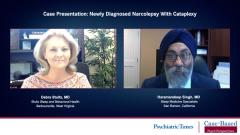
Unmet Needs in the Treatment of Narcolepsy
In this custom video series, sleep specialists discuss common unmet needs and challenges when treating patients with narcolepsy.
Episodes in this series

Haramandeep Singh, MD: What are some of the common challenges and unmet needs you face when treating patients with narcolepsy?
Debra Stultz, MD: Education is the key. We need more resources for the families and patients that are written on their level, because the family members really don’t understand it. The patients will come to the office, and they may get the diagnosis. They get excited and start looking it up online. The family members may not always do that. Just the other day, a patient I’ve treated for some time for narcolepsy kept saying, “My husband doesn’t understand it.” I said, “Bring him in. This is perfect, we’ll do a little family therapy thing.” It was helpful, but it’s going to take time. We need more education and support for the other people involved in the narcolepsy world.
We need more education for primary care providers and even sleep doctors about when to order tests for narcolepsy, the symptoms to look for, and what to order. We need to start with the patient, look at their family, and look at their providers. We need a lot for this diagnosis to keep moving forward.
Haramandeep Singh, MD: No doubt. I like that point about primary care providers and even sleep specialists, who just say, “When can we think about making the diagnosis, getting the MSLT [multiple sleep latency test] done, and even looking at ancillary symptoms of narcolepsy—sleep paralysis, hallucinations, automatic behaviors, cataplexy—and documenting that in your chart?” It’s the little things like how long you’ve been sleepy. It doesn’t take a lot. It just takes that extra few minutes to explore a little more of your patient and what’s happening for them. Those are the unmet needs.
We talked about how we definitely have options in terms of treatment, and those are going to continue to expand, which is great. We’re looking at other options coming out in the future as well that may be useful.
Debra Stultz, MD: Yes. We should be screening for all sleep disorders when the patient first comes in the sleep laboratory, and not just snoring. We need to carefully look at restless leg syndrome, whether you’re kicking in your sleep, whether you have sleep paralysis and the hypnagogic hallucinations. We should have a good sleep screener, and the sleep history should be an important part of dictating even a regular sleep study. Oftentimes, the primary care doctor says it’s excessive daytime sleepiness, and the patient thinks they’re getting an extensive sleep review. If they just get back a piece of paper that says they don’t have sleep apnea, then where do they go?
Or maybe they’ve had an MSLT before and they say, “I had that test, I don’t have narcolepsy.” That’s not true either. MSLTs are like EKGs [electrocardiogram]; it’s not 1 and you’re done. You wouldn’t say, “I had an EKG about 10 years ago. My heart is fine.” You’d say, “You need to do another EKG.” The same is true of you needing another MSLT. We need to look at this again. We need to make sure we study you during the MSLT off certain medicines, or considering certain medicines if you’re still on them, and that may not have been done when they had an MSLT before.
Haramandeep Singh, MD: Great points. I often comment that we’re doctors, so we should be looking at the patient holistically and not just following 1 test. You come back with a negative test, and that’s where our patients get lost. They’re like, “I’m still tired. It’s 10 years later, and now I’m depressed and unmotivated, and I can’t focus.” This is where we miss the boat. We have to holistically look at the patient and use the test as a guidance. Maybe we need to repeat the test and think about other options. I appreciate those points.
Transcript edited for clarity.
Disclosures:
Dr Stultz has disclosed that she serves as a consultant on the advisory board for Harmony Biosciences and that she receives support in her role with the speaker’s bureau for Harmony Biosciences and Jazz Pharmaceuticals.
Dr Singh has disclosed that he serves as a consultant and receives support in his role with the speaker's bureau for Jazz Pharmaceuticals and Harmony Biosciences.
Newsletter
Receive trusted psychiatric news, expert analysis, and clinical insights — subscribe today to support your practice and your patients.








